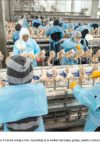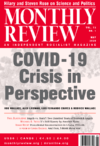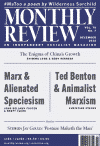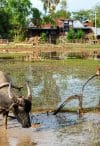Agriculture

Chris Gilbert examines the ecological aspects of Venezuela’s project of communal socialism, as well as its relation to the country’s inherited extractive economy. These democratically run communities present an alternative to the extractivist and productivist social relations driving the planet to ruin. | more…

The Fishing Revolution is a rarely explored, yet critical, event in the evolution of capitalism. Ian Angus elaborates on this revolution in the global marketplace and its role as a cornerstone of imperialism, colonialism, and capitalism in the sixteenth and seventeenth centuries. | more…

As climate change and the deforestation of the Amazon alters conditions of life across Latin America, it is clear that planetary defense will require an organized mass movement of all working people against the levers of global capital. | more…

Enhancing Agriculture and Environment
To create and preserve a permanent thriving agriculture for untold generations to come, it is essential to manage and care for soils using practices that build and maintain healthy soils. | more…

Toward a General Strike for Abolition
Poultry-processing work lies within a larger web of carceral geographies that extend beyond the prison walls into factory floors, neighborhoods, and schools. These geographies depend on and are produced through racism, as the production of unequal vulnerability to premature death. Racial capitalism connects the poultry plant to the prison alongside the movement for abolition beyond the prison. | more…

In its wider economic, ecological, epidemiological, and public health context, the current COVID-19 pandemic demonstrates the enormous dangers of the metabolic rift in human ecology and epidemiology brought on by capitalist social relations in the age of monopoly-finance capital, global agribusiness, and intricate, globe-spanning supply chains associated with the extreme exploitation and expropriation of both human beings and nature. Neoliberalism, representing the inner logic of capitalism, has left the world vulnerable to catastrophe wherever it has come into play. | more…

COVID-19, the illness caused by coronavirus SARS-CoV-2, the second severe acute respiratory syndrome virus since 2002, is now officially a pandemic. As of late March, whole cities are sheltered in place and, one by one, hospitals are lighting up in medical gridlock brought about by surges in patients. | more…

With the dramatic rise of eco-Marxism in recent years, a corresponding revolution has been taking place in studies of the human-nonhuman animal relationship. Previous critical analyses with respect to the position of animals in human society have been largely dictated by animal-rights discourse, more recently represented by figures such as Peter Singer. Many of these analyses contend that Karl Marx, Marxism, and historical materialism understand the human-nonhuman animal relationship through a dualist, “speciesist,” or human-centric, framework—a critique most famously championed by pioneering ecosocialist Ted Benton. This issue is dedicated to analyzing the theoretical propositions underlying Marx’s analysis and to demonstrate the antispeciesist and antidualist aspects of his evolutionary-materialist understanding. | more…

In many animal-rights circles, Karl Marx and a long tradition of Marxian theorists are to be faulted for their speciesist treatment of nonhuman animals and the human-nonhuman animal relationship. These criticisms typically neglect the larger historical conditions, intellectual influences, and debates out of which Marx’s treatment of the human-animal dialectic arose—even though this is crucial to any meaningful understanding of his thought in this area. In response, this article assesses the historical-intellectual background behind Marx’s arguments on humans and animals, placing it in the context of the influence exercised on his thought by Epicurus, Hermann Samuel Reimarus, Ludwig Feuerbach, Charles Darwin, and others. In the process, they explain how Marx’s view of animals in the world came to be integrated with his theory of metabolic rift and his critique of capitalism. | more…

There is by now no question among informed people that the Earth is undergoing severe climate change—soon to become catastrophic, if humans don’t take drastic measures to stop it. Heroically into the fray steps the biofuel industry, announcing to millions of anxious consumers that this eco-crisis can be averted if only they turn away from fossil fuels, to the saving power of synthetic bioproducts. But, although eliminating fossil fuels is essential, the manufacture of biofuels has far more to do with sating profit-hungry corporations than with saving the Earth. Combining meticulous scientific narrative with devastating economic analysis, The Biofuels Deception argues that the seemingly innovative, hopeful campaign for “green energy” is actually driven by bio-technology industries and global grain-trading corporations. | more…

Ecological Disasters and the Lessons of History
When scientists describe the increase of Dust Bowl-like conditions under climate change, they signal a particular kind of violent ecological and social change. But equally violent are the social forces, historical developments, policies, and practices that produce such massive socioecological crises in the first place. | more…

If the British people do not take the pains to secure the natural conditions of the permanent fertility of their land, if they allow these conditions as hitherto to be squandered, their fields will at no distant day cease to yield their returns of corn and meat. | more…











